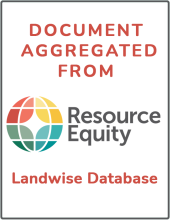/ library resources
Showing items 10 through 18 of 73418.LandLibrary Resource
31 Diciembre 2004
China
LandLibrary Resource
31 Octubre 2014
With the endorsement of the Principles for Responsible Investment in Agriculture and Food Systems (RAI) in October, attention turns to how to reflect the principles and practices outlined in the RAI in foreign assistance and public and private investments.
LandLibrary Resource
31 Diciembre 2004
China
LandLibrary Resource
31 Diciembre 2004
China
LandLibrary Resource
31 Diciembre 2004
China
LandLibrary Resource
31 Diciembre 2004
China
LandLibrary Resource
31 Diciembre 2004
China
LandLibrary Resource
31 Diciembre 2004
India
Paginación
Land Library Search
Through our robust search engine, you can search for any item of the over 64,800 highly curated resources in the Land Library.
If you would like to find an overview of what is possible, feel free to peruse the Search Guide.


